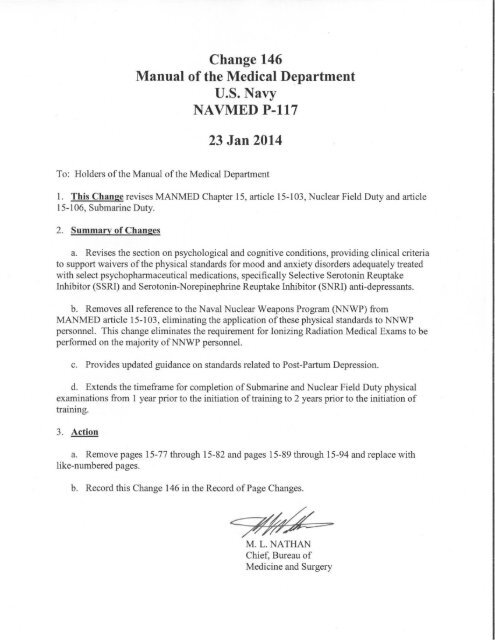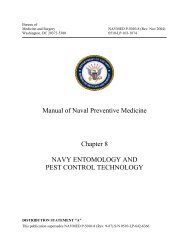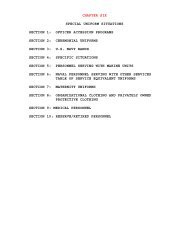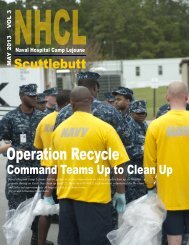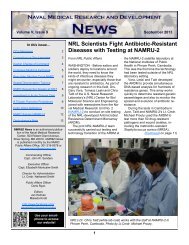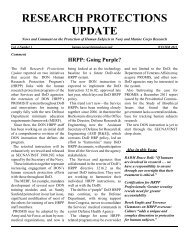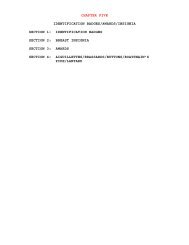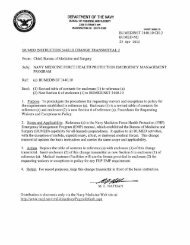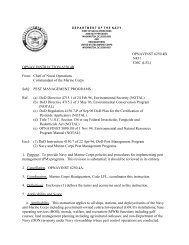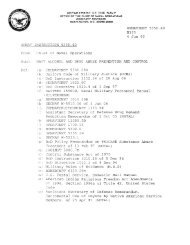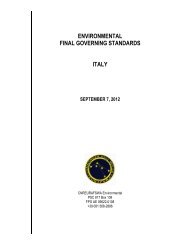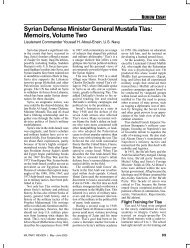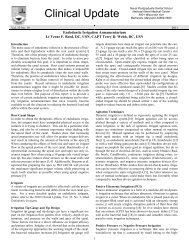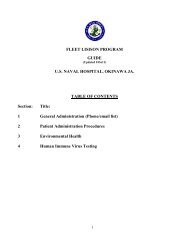Change 146 Manual of the Medical Department ... - Navy Medicine
Change 146 Manual of the Medical Department ... - Navy Medicine
Change 146 Manual of the Medical Department ... - Navy Medicine
You also want an ePaper? Increase the reach of your titles
YUMPU automatically turns print PDFs into web optimized ePapers that Google loves.
<strong>Change</strong> <strong>146</strong><br />
<strong>Manual</strong> <strong>of</strong> <strong>the</strong> <strong>Medical</strong> <strong>Department</strong><br />
U.S. <strong>Navy</strong><br />
NAVMED P-117<br />
23 Jan 2014<br />
To: Holders <strong>of</strong> <strong>the</strong> <strong>Manual</strong> <strong>of</strong> <strong>the</strong> <strong>Medical</strong> <strong>Department</strong><br />
1. This <strong>Change</strong> revises MANMED Chapter 15, article 15-103, Nuclear Field Duty and article<br />
15-106, Submarine Duty.<br />
2. Summary <strong>of</strong> <strong>Change</strong>s<br />
a. Revises <strong>the</strong> section on psychological and cognitive conditions, providing clinical criteria<br />
to support waivers <strong>of</strong> <strong>the</strong> physical standards for mood and anxiety disorders adequately treated<br />
with select psychopharmaceutical medications, specifically Selective Serotonin Reuptake<br />
Inhibitor (SSRI) and Serotonin-Norepinephrine Reuptake Inhibitor (SNRI) anti-depressants.<br />
b. Removes all reference to <strong>the</strong> Naval Nuclear Weapons Program (NNWP) from<br />
MANMED article 15-103, eliminating <strong>the</strong> application <strong>of</strong> <strong>the</strong>se physical standards to NNWP<br />
personnel. This change eliminates <strong>the</strong> requirement for Ionizing Radiation <strong>Medical</strong> Exams to be<br />
performed on <strong>the</strong> majority <strong>of</strong>NNWP personnel.<br />
c. Provides updated guidance on standards related to Post-Partum Depression.<br />
d. Extends <strong>the</strong> timeframe for completion <strong>of</strong> Submarine and Nuclear Field Duty physical<br />
examinations from 1 year prior to <strong>the</strong> initiation <strong>of</strong> training to 2 years prior to <strong>the</strong> initiation <strong>of</strong><br />
training.<br />
3. Action<br />
a. Remove pages 15-77 through 15-82 and pages 15-89 through 15-94 and replace with<br />
like-numbered pages.<br />
b. Record this <strong>Change</strong> <strong>146</strong> in <strong>the</strong> Record <strong>of</strong> Page <strong>Change</strong>s.<br />
~<br />
M. L. NATHAN<br />
Chief, Bureau <strong>of</strong><br />
<strong>Medicine</strong> and Surgery
Physical Examinations and Standards Article 15-102<br />
diver asymptomatic before return to duty is supportable<br />
by a waiver. No time limit is required post treatment<br />
but <strong>the</strong> recommendation <strong>of</strong> <strong>the</strong> attending mental<br />
health pr<strong>of</strong>essional <strong>of</strong> fitness for full duty and<br />
concurrent assessment <strong>of</strong> fitness for duty by <strong>the</strong><br />
attending undersea medical <strong>of</strong>ficer is sufficient to<br />
begin <strong>the</strong> waiver process. Use <strong>of</strong> psychotropic medication<br />
for any purpose including those that are not<br />
psychiatric such as smoking, migraine headaches,<br />
pain syndromes, is not prohibited with diving duty<br />
but should be approved by <strong>the</strong> attending undersea<br />
medical <strong>of</strong>ficer and master diver.<br />
(2) Diagnosis <strong>of</strong> alcohol dependency will<br />
result in disqualification until successful completion<br />
<strong>of</strong> a treatment program and a 1-year aftercare program.<br />
A diagnosis <strong>of</strong> alcohol abuse or alcohol<br />
incident will result in disqualification from diving<br />
duty until all recommended treatment or courses<br />
mandated by <strong>the</strong> member’s current commanding<br />
<strong>of</strong>ficer and/or SARP have been fully completed. The<br />
attending UMO will document assessment on fitness<br />
to return to diving duty and submit a waiver request<br />
package via <strong>the</strong> Bureau <strong>of</strong> <strong>Medicine</strong> and Surgery,<br />
(BUMED) Director for Undersea and Special Operations<br />
to NAVPERS.<br />
(l) Neurological<br />
(1) Idiopathic seizures are disqualifying,<br />
except febrile convulsions before age 5. Two years<br />
<strong>of</strong> non-treated seizure-free time is necessary before a<br />
waiver will be considered. Seizures with known<br />
cause may be returned earlier to duty by waiver.<br />
(2) Syncope, if recurrent, unexplained, or<br />
not responding to treatment is disqualifying.<br />
Note. All DMEs require documentation <strong>of</strong> a full neurologic<br />
examination and tympanic membrane mobility in blocks 44 and<br />
72b respectively on DD 2808.<br />
(m) Decompression Sickness/Arterial Gas<br />
Embolism<br />
(1) In diving duty candidates, any prior<br />
history <strong>of</strong> decompression sickness or arterial gas<br />
embolism is CD, and requires a waiver.<br />
(2) Designated divers diagnosed with any<br />
decompression sickness (including symptoms <strong>of</strong> joint<br />
pain or skin changes) shall:<br />
(a) Have an entry made in <strong>the</strong>ir medical<br />
record and signed by <strong>the</strong> attending UMO<br />
describing <strong>the</strong> events and treatment <strong>of</strong> <strong>the</strong> injury.<br />
(b) Be evaluated by a cardiologist for<br />
<strong>the</strong> presence <strong>of</strong> a patent foramen ovale (PFO) with<br />
<strong>the</strong> results documented in <strong>the</strong> medical record.<br />
(3) Designated divers diagnosed with<br />
AGE or DCS type II presenting with neurological,<br />
pulmonary or shock symptoms will be disqualified<br />
for diving duty pending NAVPERSCOM adjudication<br />
via BUMED Undersea Diving.<br />
(a) Obtain brain +/- spine magnetic<br />
resonance imaging (MRI) (whichever is indicated)<br />
once <strong>the</strong> diver’s condition is stabilized within 1 week<br />
from <strong>the</strong> time <strong>of</strong> <strong>the</strong> injury.<br />
(b) If initial MRI is negative, and <strong>the</strong><br />
diver had complete relief <strong>of</strong> symptoms following<br />
treatment, <strong>the</strong> diver can be returned to duty in 30<br />
days following documentation in <strong>the</strong> Service member’s<br />
record details <strong>of</strong> <strong>the</strong> clinical presentation,<br />
subsequent resolution <strong>of</strong> <strong>the</strong> injury, and interim<br />
waiver for return to duty by BUMED Undersea<br />
<strong>Medicine</strong>.<br />
(c) If initial MRI shows acute findings,<br />
or <strong>the</strong> diver has residual symptoms following<br />
treatment, <strong>the</strong> diver will remain NPQ for diving duty<br />
until a waiver is obtained from NAVPERS for<br />
resumption <strong>of</strong> diving duty. The work up should<br />
include, at a minimum:<br />
(n) Miscellaneous<br />
1. Initial MRI (within 1 week).<br />
2. Follow-up MRI at 1 month.<br />
3. Neurology consult.<br />
(1) The current use <strong>of</strong> bupropion for<br />
tobacco cessation is not disqualifying for diving duty,<br />
but attending UMO needs to put a note in <strong>the</strong> medical<br />
record authorizing continued diving duty while <strong>the</strong><br />
Service member is taking <strong>the</strong> medication.<br />
(2) Qualified divers or candidates for<br />
diving duty are NPQ for diving duty when <strong>the</strong>y are<br />
taking INH for positive PPD testing. Waiver to return<br />
to diving duty must be obtained.<br />
12 Aug 2005 <strong>Change</strong> 126 15-77
Article 15-102<br />
<strong>Manual</strong> <strong>of</strong> <strong>the</strong> <strong>Medical</strong> <strong>Department</strong><br />
(8) Special Studies<br />
(a) For candidates applying for initial dive<br />
duty and for designated divers undergoing anniversary<br />
physical examinations, <strong>the</strong> following special<br />
studies are required in support <strong>of</strong> DD 2808, and must<br />
be completed within <strong>the</strong> following timeframes:<br />
or II).<br />
(1) Within 3 months <strong>of</strong> <strong>the</strong> exam date:<br />
(a) Chest x-ray (PA and lateral).<br />
(b) Electrocardiogram.<br />
(c) Audiogram.<br />
(d) Dental Class (must be Class I<br />
(e) PPD.<br />
(f) Vision (visual acuity, manifest<br />
refraction if uncorrected distant or near visual acuity<br />
is less than 20/20, field <strong>of</strong> vision, IOP if >40YO,<br />
color vision testing following MANMED article 15-<br />
36(1)(d)).<br />
(g) CBC.<br />
(h) Urinalysis.<br />
(i) Fasting blood glucose.<br />
(j) Hepatitis C screening.<br />
(2) Any time prior to dive training (do<br />
not repeat for retention physicals):<br />
(a) Blood type.<br />
(b) G6PD.<br />
(c) Sickle cell.<br />
(b) In addition to BUMEDINST 6230.15<br />
series (Immunization and Chemoprophylaxis) requirements,<br />
all diver candidates and designated<br />
divers must be immunized against both Hepatitis A<br />
and B. Diver candidates must have two doses <strong>of</strong><br />
Hepatitis A immunization and at least <strong>the</strong> first two<br />
out <strong>of</strong> three doses <strong>of</strong> Hepatitis B immunization prior<br />
to <strong>the</strong> start <strong>of</strong> diver training.<br />
15-103 Nuclear Field Duty<br />
(1) Characteristics. Nuclear field duty involves<br />
work in <strong>the</strong> Naval Nuclear Propulsion Program. A<br />
very high degree <strong>of</strong> reliability, alertness, and good<br />
judgment is required in order for operations to be<br />
conducted safely and to maintain <strong>the</strong> integrity and<br />
accountability <strong>of</strong> <strong>the</strong>se critical programs. It should be<br />
noted that nuclear field duty is not <strong>the</strong> same as occupational<br />
exposure to ionizing radiation (ionizing<br />
radiation work). While all nuclear field personnel<br />
must also be qualified as ionizing radiation workers,<br />
not all ionizing radiation workers are nuclear field<br />
personnel. Examples <strong>of</strong> <strong>the</strong> latter category are medical<br />
radiology personnel, industrial radiographers, and<br />
most nuclear weapons missile technicians assigned to<br />
<strong>the</strong> Submarine Force.<br />
(2) Applicability. Current and prospective<br />
nuclear field personnel.<br />
(3) Examinations<br />
(a) Periodicity. For candidates, no more<br />
than 2 years before reporting for initial nuclear field<br />
training. Periodicity between examinations will not<br />
exceed 5 years up to age 50. After age 50, periodicity<br />
will not exceed every 2 years, e.g., an individual<br />
examined at age 46 would be re-examined at age 51,<br />
an individual examined at age 47, 48, 49, or 50 would<br />
be re-examined at age 52. Beginning at age 60, <strong>the</strong><br />
examination is required annually. Nuclear field duty<br />
examinations must be performed no later than 1<br />
month following <strong>the</strong> anniversary date (month and<br />
year) <strong>of</strong> <strong>the</strong> previous physical examination date. For<br />
example, for an exam performed on a 20-year-old on<br />
<strong>the</strong> 15th <strong>of</strong> February 2010, <strong>the</strong> next examination must<br />
be completed by 31 March 2015. A complete physical<br />
examination is also required prior to returning to<br />
Nuclear Field Duty after a period <strong>of</strong> disqualification.<br />
All Nuclear Field Duty examinations shall be performed<br />
concurrently with a Radiation <strong>Medical</strong> Exam<br />
(RME), (per MANMED article 15-104 and <strong>the</strong><br />
NAVMED P-5055) and documented separately on<br />
<strong>the</strong>ir respective forms.<br />
(b) Scope. The examiner will pay special<br />
attention to <strong>the</strong> mental status, psychiatric, and neurologic<br />
components <strong>of</strong> <strong>the</strong> examination, and will review<br />
<strong>the</strong> entire health record for evidence <strong>of</strong> past impairment.<br />
Specifically, <strong>the</strong> individual will be questioned<br />
about anxiety related to working with nuclear power,<br />
15-78 <strong>Change</strong> <strong>146</strong> 23 Jan 2014
Physical Examinations and Standards Article 15-103<br />
difficulty getting along with o<strong>the</strong>r personnel, and<br />
history <strong>of</strong> suicidal or homicidal behavior (ideation,<br />
gesture, or attempt). The only laboratory tests<br />
required are those done for <strong>the</strong> concurrent RME. The<br />
examination shall be recorded on DD Form 2807-1<br />
and DD Form 2808. Laboratory data and radiationspecific<br />
historical questions documented on <strong>the</strong><br />
NAVMED 6470/13 for <strong>the</strong> RME need not be duplicated<br />
on <strong>the</strong> DD Form 2807-1 and DD Form 2808 for<br />
<strong>the</strong> Nuclear Field Duty examination. The following<br />
studies are required within 3 months prior to <strong>the</strong><br />
exam:<br />
(1) Audiogram.<br />
(2) Visual acuity.<br />
(3) Color vision (per MANMED Chapter<br />
15, article 15-36(1)(d)).<br />
(c) Examiners. Nuclear Field Duty physical<br />
examinations may be performed by any physician,<br />
physician assistant, or nurse practitioner with<br />
appropriate clinical privileges. Examinations not performed<br />
by an undersea medical <strong>of</strong>ficer (UMO) or<br />
graduate <strong>of</strong> a Residency in Aerospace <strong>Medicine</strong><br />
(RAM) will be reviewed and co-signed by a UMO or<br />
RAM. All reviewing authority signatures must be<br />
accompanied by <strong>the</strong> “UMO” or “RAM” designation,<br />
as appropriate. A UMO is defined as a medical <strong>of</strong>ficer<br />
who has successfully completed <strong>the</strong> entire UMO<br />
Course conducted by <strong>the</strong> Naval Undersea <strong>Medical</strong><br />
Institute.<br />
(4) Standards. The standards delineated in this<br />
chapter define <strong>the</strong> conditions which are considered<br />
disqualifying for Nuclear Field Duty. The standards<br />
delineated in Chapter 15, Section III (General Standards)<br />
are universally applicable to all Nuclear Field<br />
Duty candidates. Certain <strong>of</strong> <strong>the</strong> General Standards<br />
are applicable to continued qualification for Nuclear<br />
Field Duty whereas o<strong>the</strong>rs are not. UMOs and<br />
RAMs, based on <strong>the</strong>ir specialty training and subject<br />
matter expertise, are charged with applying <strong>the</strong><br />
General Standards to qualified nuclear field personnel<br />
when appropriate to ensure physical and<br />
mental readiness to perform <strong>the</strong>ir duties without<br />
limitation. Standards in this article take precedence<br />
over General Standards where conflicts exist. All<br />
nuclear field personnel must meet <strong>the</strong> physical<br />
standards for occupational exposure to ionizing radiation<br />
(see MANMED article 15-104 and NAVMED P-<br />
5055). Submarine designated nuclear field personnel<br />
must meet <strong>the</strong> physical standards for submarine duty<br />
(see MANMED article 15-106). The reliability, alertness,<br />
and good judgment<br />
<strong>of</strong> Naval Nuclear Weapons Program personnel is<br />
monitored and ensured by <strong>the</strong> requirements <strong>of</strong> <strong>the</strong><br />
Personnel Reliability Program (SECNAVINST<br />
5510.35 series).<br />
(a) General. Any condition, combination<br />
<strong>of</strong> conditions, or treatment which may impair judgment<br />
or alertness, adversely affect reliability, or<br />
foster a perception <strong>of</strong> impairment is disqualifying.<br />
Nuclear field personnel returning to duty following<br />
an absence <strong>of</strong> greater than 7 days due to illness or<br />
injury, hospitalization for any reason, or after being<br />
reported on by a medical board must have a properly<br />
documented UMO or RAM evaluation to determine<br />
fitness for continued Nuclear Field Duty.<br />
(b) Hearing. Demonstrated inability to<br />
communicate and perform duty is disqualifying.<br />
(c) Eyes<br />
(1) Visual acuity not correctable to<br />
20/25 in at least one eye is disqualifying.<br />
(2) Defective color vision is disqualifying.<br />
For qualified nuclear field workers, waiver<br />
requests must include a statement from <strong>the</strong> member’s<br />
supervisor stating that <strong>the</strong> member is able to perform<br />
his or her job accurately and without difficulty. For<br />
candidates, <strong>the</strong> examiner must include evidence that<br />
primary and secondary colors can be discerned.<br />
(d) Psychological and Cognitive. Psychological<br />
fitness for Nuclear Field Duty must be<br />
carefully and continuously evaluated in all nuclear<br />
field personnel. It is imperative that individuals<br />
working in <strong>the</strong>se programs have a very high degree <strong>of</strong><br />
reliability, alertness, and good judgment. Any current<br />
or history <strong>of</strong> an Axis I diagnosis as defined by <strong>the</strong><br />
current version <strong>of</strong> <strong>the</strong> American Psychiatric Association’s<br />
Diagnostic and Statistical <strong>Manual</strong> for Mental<br />
Disorders (DSM) is disqualifying, to include:<br />
(1) Current or history <strong>of</strong> delirium,<br />
dementia, amnestic and o<strong>the</strong>r cognitive disorders,<br />
mental disorders due to a general medical condition,<br />
schizophrenia and o<strong>the</strong>r psychotic disorders, somat<strong>of</strong>orm<br />
disorders, factitious disorders, dissociative<br />
disorders, eating disorders, and impulse-control disorders<br />
not elsewhere classified are disqualifying.<br />
(2) Current or history <strong>of</strong> Mood Disorders<br />
and/or Anxiety Disorders (including Adjustment<br />
Disorders) as listed in <strong>the</strong> DSM Axis I is<br />
considered disqualifying, but may be considered for a<br />
waiver once <strong>the</strong> Service member’s condition is stable<br />
and asymptomatic.<br />
23 Jan 2014 <strong>Change</strong> <strong>146</strong> 15-79
Article 15-103<br />
(a) Treatment <strong>of</strong> Mood Disorders and/or<br />
Anxiety Disorders (including Adjustment Disorders)<br />
with psychopharmaceuticals to achieve and maintain<br />
stabilization is waiverable for Nuclear Field Duty<br />
qualified personnel, depending on <strong>the</strong> medications<br />
used and <strong>the</strong> timelines involved (see MANMED<br />
article 15-103, paragraph (4)(d)(2)(b)7. below).<br />
Candidates requiring treatment with psychopharmaceuticals<br />
are disqualified and not eligible for a waiver<br />
until treatment is complete (MANMED article 15-<br />
103, paragraph (4)(d)(11) applies).<br />
(b) Waivers for continuation <strong>of</strong> Nuclear<br />
Field Duty while taking selected psychopharmaceuticals<br />
for Mood Disorders and/or Anxiety Disorders<br />
(including Adjustment Disorder) will require<br />
that all <strong>of</strong> <strong>the</strong> following criteria are met:<br />
1. The Service member must be<br />
evaluated by a military-employed psychiatrist.<br />
2. The condition must be categorized<br />
as stable, resolved, or in remission.<br />
3. The Service member must be<br />
clinically stable on <strong>the</strong> recommended dosage <strong>of</strong><br />
medication without any military duty performanceimpairing<br />
side effects.<br />
4. The Service member must have<br />
access to <strong>the</strong> recommended level <strong>of</strong> follow-up with<br />
<strong>the</strong>ir mental health provider and primary care manager<br />
(PCM). For submarine duty personnel, <strong>the</strong><br />
condition must be stable enough to allow follow-up<br />
solely with an Independent Duty Corpsman for up to<br />
6 months at a time. Nuclear Field Duty personnel<br />
assigned to aircraft carriers (CVN) will have ready<br />
access to Licensed Independent Practitioners (Physician<br />
Assistant (PA), Nurse Practitioner (NP), Physician,<br />
and Psychologist) for follow-up.<br />
5. Personnel who have experienced<br />
suicidal ideation (SI) in conjunction with <strong>the</strong>ir<br />
Mood and/or Anxiety Disorder may still be considered<br />
for a psychopharmaceutical use waiver in<br />
conjunction with a waiver for <strong>the</strong>ir underlying<br />
psychological condition and <strong>the</strong>ir suicidal behavior.<br />
6. Individuals who have displayed<br />
suicidality in <strong>the</strong> form <strong>of</strong> a suicidal gesture (SG) or<br />
suicide attempt (SA), as defined by a mental health<br />
pr<strong>of</strong>essional, will not be eligible for a psychopharmaceutical<br />
use waiver. A waiver to return to Nuclear<br />
Field Duty after an SG or SA will require cessation<br />
<strong>of</strong> medication use in conjunction with complete<br />
resolution <strong>of</strong> <strong>the</strong>ir condition, in addition to a recommendation<br />
from a doctoral level mental health provider<br />
and <strong>the</strong> UMO.<br />
<strong>Manual</strong> <strong>of</strong> <strong>the</strong> <strong>Medical</strong> <strong>Department</strong><br />
7. Psychopharmaceutical specifics:<br />
Requirements before waiver consideration include:<br />
i. Only Selective Serotonin<br />
Reuptake Inhibitor (SSRI)/Serotonin-Norepinephrine<br />
Reuptake Inhibitor (SNRI) medications are authorized<br />
for consideration <strong>of</strong> a waiver at this time.<br />
ii. The Service member must<br />
have been on <strong>the</strong> medication for at least 3 months<br />
without complications or performance-impairing side<br />
effects.<br />
iii. The Service member must<br />
be on a stable dosage <strong>of</strong> medication (i.e., no dose<br />
change in <strong>the</strong> month prior to waiver submission).<br />
iv. The Service member’s condition<br />
must be well-controlled (asymptomatic) on <strong>the</strong><br />
current dose <strong>of</strong> medication.<br />
(3) Post-Partum Depression <strong>of</strong> limited<br />
duration is not normally disqualifying for Nuclear<br />
Field Duty. Cases which resolve quickly, within <strong>the</strong><br />
6-week maternity leave period, may be found fit for<br />
Nuclear Field Duty by <strong>the</strong> attending UMO or RAM.<br />
Cases <strong>of</strong> longer duration and/or requiring psychopharmaceutical<br />
use and/or involving suicidality are<br />
disqualifying and waiver will be considered after<br />
complete resolution.<br />
(4) Disorders usually first diagnosed in<br />
infancy, childhood, or adolescence, sleep disorders,<br />
and sexual and gender identity disorders are disqualifying<br />
if <strong>the</strong>y interfere with safety and reliability<br />
or foster a perception <strong>of</strong> impairment.<br />
(a) Current Attention Deficit Hyperactivity<br />
Disorder (ADHD) is disqualifying, but a<br />
history <strong>of</strong> ADHD greater than 1 year prior to military<br />
service is not disqualifying.<br />
(b) Communication disorders, including<br />
but not limited to any speech impediment<br />
which significantly interferes with production <strong>of</strong><br />
speech, repeating <strong>of</strong> commands, or allowing clear<br />
verbal communications, are disqualifying.<br />
(5) Personality disorders are disqualifying<br />
for Nuclear Field Duty candidates. For nuclear<br />
field designated personnel, personality disorders may<br />
be administratively disqualifying if <strong>the</strong>y are <strong>of</strong> significant<br />
severity as to preclude safe and successful performance<br />
<strong>of</strong> duties. In <strong>the</strong>se cases, administrative<br />
processing should be pursued per <strong>the</strong> Military Personnel<br />
<strong>Manual</strong> (MILPERSMAN). The term “environmental<br />
unadaptability” is not a medical diagnosis<br />
and should not be used in medical assessments. A<br />
command may use “environmental unadaptability” as<br />
15-80 <strong>Change</strong> <strong>146</strong> 23 Jan 2014
Physical Examinations and Standards Article 15-103<br />
justification for administrative disqualification from<br />
Nuclear Field Duty, particularly in those individuals<br />
whose maladaptive behavior precludes acceptable<br />
performance <strong>of</strong> <strong>the</strong>ir duties or fosters <strong>the</strong> perception<br />
<strong>of</strong> impairment or unreliability.<br />
(6) Adjustment disorders and brief situational<br />
emotional distress such as acute stress<br />
reactions or bereavement are not normally disqualifying<br />
for Nuclear Field Duty. Individuals with <strong>the</strong>se<br />
conditions shall be evaluated by <strong>the</strong> attending UMO<br />
or RAM, in conjunction with formal mental health<br />
evaluation. In cases which resolve completely within<br />
30 days, individuals may be found fit for Nuclear<br />
Field Duty by <strong>the</strong> attending UMO or RAM. Conditions<br />
lasting longer than 30 days are disqualifying.<br />
Waiver may be considered after complete resolution.<br />
(7) History <strong>of</strong> suicidal ideation, gesture,<br />
or attempt is disqualifying. These situations<br />
must be taken very seriously and require formal<br />
evaluation by a mental health specialist. Waivers will<br />
be considered based on <strong>the</strong> underlying condition as<br />
determined by <strong>the</strong> attending UMO or RAM and<br />
mental health pr<strong>of</strong>essional. Any consideration for<br />
return to duty must address whe<strong>the</strong>r <strong>the</strong> Service<br />
member, in <strong>the</strong> written opinions <strong>of</strong> <strong>the</strong> attending<br />
UMO or RAM and mental health provider, can return<br />
successfully to <strong>the</strong> specific stresses and environment<br />
<strong>of</strong> Nuclear Field Duty.<br />
(8) History <strong>of</strong> self-mutilation, including<br />
but not limited to cutting, burning, and o<strong>the</strong>r selfinflicted<br />
wounds, is disqualifying whe<strong>the</strong>r occurring<br />
in conjunction with suicidality or as an abnormal<br />
coping mechanism.<br />
(9) Substance Abuse and Dependence<br />
(a) <strong>Medical</strong>ly disqualifying for all<br />
nuclear field candidates. Waiver requests must<br />
include documentation <strong>of</strong> successful completion <strong>of</strong><br />
treatment and aftercare.<br />
(b) All qualified nuclear field personnel<br />
with substance abuse or dependence will be<br />
managed administratively per OPNAVINST 5355.3<br />
series and do not require medical disqualification<br />
unless a medically disqualifying diagnosis is present<br />
in addition to substance abuse or dependence.<br />
(c) Illicit drug use, historical or<br />
current, is to be managed administratively per<br />
OPNAVINST 5355.3 series, SECNAVINST 5300.28<br />
series, and any o<strong>the</strong>r applicable directives.<br />
(10) History <strong>of</strong> o<strong>the</strong>r mental disorders<br />
not listed above, which, in <strong>the</strong> opinion <strong>of</strong> <strong>the</strong> UMO or<br />
RAM, will interfere with or prevent satisfactory performance<br />
<strong>of</strong> Nuclear Field Duty is disqualifying.<br />
(11) Any use <strong>of</strong> psychopharmaceuticals<br />
for any indication within <strong>the</strong> preceding year is disqualifying.<br />
Waivers will be considered for ongoing<br />
clinical treatment with SSRI/SNRI medications as<br />
per policy defined in MANMED article 15-103,<br />
paragraph (4)(d)(2) above. For use <strong>of</strong> all o<strong>the</strong>r<br />
psychopharmaceutical medications, waivers will be<br />
considered after a 60-day interval <strong>of</strong>f medication if<br />
<strong>the</strong> individual has been examined and cleared by a<br />
doctoral level mental health provider. The mental<br />
health provider shall comment specifically on <strong>the</strong><br />
presence or absence <strong>of</strong> any withdrawal, discontinuation<br />
rebound, or o<strong>the</strong>r such symptoms attributable to<br />
<strong>the</strong> episode <strong>of</strong> psychopharmaceutical use. Individuals<br />
who experience any <strong>of</strong> <strong>the</strong>se symptoms must be<br />
symptom free for 60 days before a waiver will be<br />
considered.<br />
(a) For <strong>the</strong> purpose <strong>of</strong> this article,<br />
“psychopharmaceutical” is defined as a prescription<br />
medication with primary activity in <strong>the</strong> central<br />
nervous system. This includes, but is not limited to,<br />
all anti-depressants, anti-psychotics, anti-epileptics,<br />
sedative/hypnotics, stimulants, anxiolytics, smoking<br />
cessation agents o<strong>the</strong>r than nicotine, Drug Enforcement<br />
Agency (DEA) scheduled medications, and<br />
bipolar agents.<br />
Note. Many non-psychiatric medications possess psychopharmaceutical<br />
properties and are considered disqualifying per<br />
this article. Examples include: Isotretinoin (Accutane), mefloquine<br />
(Lariam), gabapentin (Neurontin), and o<strong>the</strong>rs.<br />
(b) Exceptions. Zolpidem (Ambien)<br />
prescribed for jet lag, medications prescribed or<br />
administered for facilitation <strong>of</strong> a medical or dental<br />
surgery or procedure, narcotic and syn<strong>the</strong>tic opioid<br />
pain medications prescribed for acute pain management,<br />
anti-emetics for acute nausea, and muscle<br />
relaxants (such as cyclobenzaprine or diazepam) for<br />
acute musculoskeletal spasm and/or pain are not<br />
disqualifying. Acute treatment is limited to 2 weeks<br />
<strong>of</strong> continuous medication usage.<br />
(c) Use <strong>of</strong> any DEA Schedule I drug<br />
for any reason, including religious sacraments, is<br />
disqualifying.<br />
23 Jan 2014 <strong>Change</strong> <strong>146</strong> 15-81
Article 15-103<br />
<strong>Manual</strong> <strong>of</strong> <strong>the</strong> <strong>Medical</strong> <strong>Department</strong><br />
(e) Miscellaneous<br />
(1) A history <strong>of</strong> chronic pain (e.g.,<br />
abdominal pain, chest pain, and headache) which is<br />
recurrent or incapacitating such that it prevents completion<br />
<strong>of</strong> daily duty assignments or compromises<br />
reliability is disqualifying.<br />
(2) Recurrent syncope is disqualifying.<br />
Waiver will be considered only after demonstration<br />
<strong>of</strong> a definitive diagnosis and effective prophylactic<br />
treatment.<br />
(5) Waivers. Requests for waiver <strong>of</strong> physical<br />
standards will be sent from <strong>the</strong> member’s commander,<br />
commanding <strong>of</strong>ficer, or <strong>of</strong>ficer in charge to <strong>the</strong><br />
appropriate Bureau <strong>of</strong> Naval Personnel code via<br />
Bureau <strong>of</strong> <strong>Medicine</strong> and Surgery (BUMED) Undersea<br />
<strong>Medicine</strong> and Radiation Health (BUMED-<br />
M3B3), and any applicable immediate superior in<br />
command (ISIC) and/or type commander (TYCOM).<br />
Interim dispositions may be granted by BUMED-<br />
M3B3 via de-identified or encrypted e-mail. In <strong>the</strong>se<br />
cases, BUMED must receive <strong>the</strong> formal waiver package<br />
within 6 months after <strong>the</strong> interim disposition is<br />
given. BUMED’s final recommendation shall be<br />
based on <strong>the</strong> member’s status at <strong>the</strong> time <strong>the</strong> formal<br />
package is considered, and may differ from an<br />
interim recommendation if <strong>the</strong>re has been a change in<br />
<strong>the</strong> member’s condition or if information present in<br />
<strong>the</strong> formal package dictates a change in recommendation.<br />
Individuals with conditions which are also<br />
disqualifying for occupational exposure to ionizing<br />
radiation require consideration by <strong>the</strong> Radiation<br />
Effects Advisory Board per MANMED article 15-<br />
104 and NAVMED P-5055.<br />
15-104 Occupational Exposure<br />
to Ionizing Radiation<br />
(1) General. NAVMED P-5055, Radiation<br />
Health Protection <strong>Manual</strong>, is <strong>the</strong> governing document<br />
for <strong>the</strong> <strong>Navy</strong>’s Radiation Health Protection Program.<br />
To ensure that <strong>the</strong> requirements <strong>of</strong> NAVMED P-5055<br />
are met and to eliminate any potential for conflicting<br />
guidance, <strong>the</strong> specific standards and examination<br />
procedures for occupational exposure to ionizing<br />
radiation are found only in NAVMED P-5055,<br />
Chapter 2. The current version <strong>of</strong> NAVMED P-5055<br />
is available on <strong>the</strong> <strong>Navy</strong> <strong>Medicine</strong> Web site at:<br />
http://www.med.navy.mil/directives/Pages/Publicatio<br />
ns.aspx.<br />
15-82 <strong>Change</strong> <strong>146</strong> 23 Jan 2014
Physical Examinations and Standards Article 15-105<br />
(3) Peripheral neuropathy due to<br />
systemic disease is disqualifying. Impingement<br />
neuropathy (e.g., carpal tunnel syndrome) is not<br />
disqualifying if a surgical cure is achieved.<br />
Small, isolated patches <strong>of</strong> diminished sensory<br />
function are not disqualifying if not due to a<br />
systemic or central process, but must be<br />
thoroughly documented in <strong>the</strong> health record.<br />
(4) Speech impediments (stammering,<br />
stuttering, etc.) that impair communication<br />
are disqualifying.<br />
(5) Any history <strong>of</strong> surgery involving<br />
<strong>the</strong> central nervous system is disqualifying.<br />
(6) Cerebrovascular disease including<br />
stroke, transient ischemic attack, and vascular<br />
malformation are disqualifying.<br />
(7) Closed head injury is disqualifying<br />
if <strong>the</strong>re is:<br />
(a) Cerebrospinal fluid leak.<br />
(b) Intracranial bleeding.<br />
(c) Depressed skull fracture<br />
with dural laceration.<br />
(d) Post-traumatic amnesia<br />
(PTA) in accordance with <strong>the</strong> following schedule:<br />
1. PTA less than 1 hour<br />
is disqualifying for at least 1 month. A normal<br />
brain MRI and normal examination by a<br />
neurologist or neurosurgeon is required before<br />
return to duty. If 2 years has elapsed since <strong>the</strong><br />
injury, an MRI is required, specialty consultation<br />
is not.<br />
2. PTA greater than 1<br />
hour is permanently disqualifying for candidates.<br />
Waiver may be entertained for designated SO<br />
personnel after 1 year if brain MRI and neurologic<br />
and neuropsychological evaluations are<br />
normal.<br />
(8) History <strong>of</strong> penetrating head<br />
injury is disqualifying.<br />
(m) Skin. Any chronic condition which<br />
requires frequent health care encounters, is<br />
unresponsive to topical treatment, causes long<br />
term compromise <strong>of</strong> skin integrity, interferes with<br />
<strong>the</strong> wearing <strong>of</strong> required equipment, clothing, or<br />
camouflage paint, or which may be exacerbated<br />
by sun exposure is disqualifying.<br />
(n) Miscellaneous<br />
(1) Chronic viral illnesses (except<br />
those with manifestations limited to <strong>the</strong> skin) are<br />
disqualifying.<br />
(2) Cancer treatment (except excision<br />
<strong>of</strong> skin cancer) within <strong>the</strong> preceding year is<br />
disqualifying.<br />
(3) Chronic immune insufficiency<br />
<strong>of</strong> any cause, chronic anemia, abnormal hemoglobin<br />
(including sickle cell trait), and defects <strong>of</strong><br />
platelet function or coagulability are disqualifying.<br />
(4) Allergic or atopic conditions<br />
which require allergy immuno<strong>the</strong>rapy are disqualifying<br />
until completion <strong>of</strong> desensitization<br />
<strong>the</strong>rapy.<br />
(5) Current history <strong>of</strong> severe allergic<br />
reaction or anaphylaxis to environmental<br />
substances or any foods is disqualifying. Any<br />
allergy with life threatening manifestations is<br />
disqualifying.<br />
(6) Chronic or recurrent pain syndromes<br />
that may mimic serious disease (e.g.,<br />
abdominal pain, chest pain, and headache) are<br />
disqualifying.<br />
(7) Recurrent syncope is disqualifying.<br />
Waiver will be considered only after<br />
demonstration <strong>of</strong> a definitive diagnosis and<br />
effective prophylactic treatment.<br />
(8) Medications<br />
(a) For candidates, daily or<br />
frequent use <strong>of</strong> any medication is disqualifying.<br />
(b) For designated SO personnel,<br />
use <strong>of</strong> any medication that may<br />
compromise mental or behavioral function, limit<br />
aerobic endurance, or pose a significant risk <strong>of</strong><br />
mentally or physically impairing side effects is<br />
disqualifying. Any requirement for a medication<br />
that necessitates close monitoring, regular tests,<br />
refrigeration, or parenteral administration on a<br />
24 Jan 2012 <strong>Change</strong> 139 15-89
Article 15-105<br />
biweekly or more frequent basis is disqualifying.<br />
Requirement for medication which would pose a<br />
significant health risk if suddenly stopped for 1<br />
month or more is disqualifying.<br />
(c) SO designated personnel taking<br />
medicines prescribed by a non-DoD provider are<br />
disqualified until reviewed and approved by <strong>the</strong><br />
Service member’s UMO.<br />
(9) Vaccinations. Candidate or SOdesignated<br />
personnel refusing to receive<br />
recommended vaccines (preventive health or <strong>the</strong>atre<br />
specific vaccines recommended by <strong>the</strong> Combatant<br />
Command (COCOM)) based solely on personal or<br />
religious beliefs are disqualified. This does not<br />
pertain to medical contraindications or allergies to<br />
vaccine administration.<br />
(5) Waivers. Requests for waiver <strong>of</strong> physical<br />
standards for candidates or designated personnel who<br />
do not meet minimum standards will be sent from <strong>the</strong><br />
member’s commanding <strong>of</strong>ficer to <strong>the</strong> appropriate<br />
Bureau <strong>of</strong> Naval Personnel code or Headquarters,<br />
Marine Corps via Bureau <strong>of</strong> <strong>Medicine</strong> and Surgery,<br />
Undersea <strong>Medicine</strong> and Radiation Health (BUMED-<br />
M3B3) and any applicable Immediate Superior in<br />
Command (ISIC) and/or Type Commander<br />
(TYCOM). If <strong>the</strong> candidate is a new <strong>Navy</strong> accession,<br />
enlistment/ commissioning qualifications must first<br />
be approved by BUMED, Physical Qualifications and<br />
Standards (BUMED-M9), before special duty<br />
determination will be considered by BUMED Head,<br />
Undersea <strong>Medicine</strong> (BUMED-M3B3). Interim<br />
dispositions may be granted by BUMED via deidentified<br />
or encrypted e-mail. In <strong>the</strong>se cases,<br />
BUMED must receive <strong>the</strong> formal waiver package<br />
within 6 months after <strong>the</strong> interim dis-position is<br />
given. BUMED’s final recommendation shall be<br />
based on <strong>the</strong> member’s status at <strong>the</strong> time <strong>the</strong> formal<br />
package is considered, and may differ from an<br />
interim recommendation if <strong>the</strong>re has been a change in<br />
<strong>the</strong> member’s condition or if information presented in<br />
<strong>the</strong> formal package dictates a change in recommendation.<br />
Interim waivers will not be considered for any<br />
Service member or candidate who has previously<br />
been disqualified from SO duty. In such cases only<br />
formal waiver packages will be considered for <strong>the</strong><br />
member’s reinstatement.<br />
<strong>Manual</strong> <strong>of</strong> <strong>the</strong> <strong>Medical</strong> <strong>Department</strong><br />
15-106 Submarine Duty<br />
(1) Characteristics. Submarine duty is characterized<br />
by isolation, medical austerity, need for<br />
reliability, prolonged subsistence in enclosed spaces,<br />
exposure to atmosphere contaminants, and psychological<br />
stress. The purpose <strong>of</strong> <strong>the</strong> submarine duty<br />
standards is to maximize mission capability by ensuring<br />
<strong>the</strong> mental and physical readiness <strong>of</strong> <strong>the</strong> Submarine<br />
Force.<br />
(2) Applicability. Current and prospective submariners<br />
and UMO. Non-submariner personnel<br />
embarked on submarines (“riders”) will comply with<br />
OPNAVINST 6420.1 series.<br />
(3) Examinations<br />
(a) Periodicity. For candidates, no more than<br />
2 years before reporting for initial submarine training.<br />
Periodicity between examinations will not<br />
exceed 5 years up to age 50. After age 50, periodicity<br />
will not exceed 2 years, e.g., an individual examined<br />
at age 46 would be re-examined at age 51, an individual<br />
examined at age 47, 48, 49, or 50 would be reexamined<br />
at age 52. Beginning at age 60, <strong>the</strong> examination<br />
is required annually. Submarine duty examinations<br />
must be performed no later than 1 month<br />
following <strong>the</strong> anniversary date (month and year) <strong>of</strong><br />
<strong>the</strong> previous physical examination date. For<br />
example, for an examination performed on a 20-yearold<br />
on 15 February 2010, <strong>the</strong> next examination must<br />
be completed by 31 March 2015. A complete<br />
physical examination is also required prior to<br />
returning to sub-marine duty after a period <strong>of</strong><br />
disqualification.<br />
(b) Scope. The examiner will pay special<br />
attention to <strong>the</strong> mental status, psychiatric, and neurologic<br />
components <strong>of</strong> <strong>the</strong> examination, and will review<br />
<strong>the</strong> entire health record for evidence <strong>of</strong> past impairment.<br />
Specifically, <strong>the</strong> individual will be questioned<br />
about difficulty getting along with o<strong>the</strong>r personnel,<br />
history <strong>of</strong> suicidal or homicidal behavior (ideation,<br />
gesture, attempt), and anxiety related to tight or<br />
closed spaces, nuclear power, or nuclear weapons.<br />
The examination shall be recorded on <strong>the</strong> DD Form<br />
2807-1 and DD Form 2808. For female examinees,<br />
<strong>the</strong> NAVMED 6420/2 (Health and Reproductive Risk<br />
Counseling for Female Submariners and Submarine<br />
Candidates) is also required. If within required<br />
periodicity, portions <strong>of</strong> <strong>the</strong> examination typically<br />
23 Jan 2014 <strong>Change</strong> <strong>146</strong> 15-90
Physical Examinations and Standards Article 15-106<br />
performed in conjunction with <strong>the</strong> annual women’s<br />
health exam (e.g., breast, genitalia, pelvic, anus, and<br />
rectum) may be transcribed with proper attribution<br />
ra<strong>the</strong>r than repeated, and need not be performed by<br />
<strong>the</strong> examiner performing <strong>the</strong> submarine duty exam.<br />
The following studies are required within 3 months<br />
prior to <strong>the</strong> exam unless o<strong>the</strong>rwise specified:<br />
(1) PA and lateral x-rays <strong>of</strong> <strong>the</strong> chest<br />
(for candidates only).<br />
(2) Latent tuberculosis infection skin<br />
testing within preceding 6 months.<br />
(3) Audiogram.<br />
(4) Visual acuity.<br />
(5) Color vision (as determined by<br />
MANMED article 15-36(1)(d)).<br />
(6) Dental exam.<br />
(7) Pap smear within preceding 12<br />
months (female only).<br />
(8) Mammogram within preceding 12<br />
months (female starting at age 40 or earlier if at high<br />
risk per current guidelines).<br />
(c) Examiners. Submarine duty physical<br />
examinations may be performed by any physician,<br />
physician assistant, or nurse practitioner with appropriate<br />
clinical privileges. Examinations not performed<br />
by a UMO shall be reviewed and co-signed<br />
by a UMO. All reviewing authority signatures must<br />
be accompanied by <strong>the</strong> “UMO” designation. A UMO<br />
is defined as a medical <strong>of</strong>ficer who has successfully<br />
completed <strong>the</strong> entire UMO Course conducted by <strong>the</strong><br />
Naval Undersea <strong>Medical</strong> Institute.<br />
(4) Standards. The standards delineated in this<br />
chapter define <strong>the</strong> conditions which are considered<br />
disqualifying for submarine duty. The standards<br />
delineated in Chapter 15, Section III (General Standards)<br />
are universally applicable to all submarine duty<br />
candidates. Certain <strong>of</strong> <strong>the</strong> General Standards are<br />
applicable to continued qualification for submarine<br />
duty whereas o<strong>the</strong>rs are not. UMOs, based on <strong>the</strong>ir<br />
specialty training and subject matter expertise, are<br />
charged with applying <strong>the</strong> General Standards to<br />
qualified submarine personnel when appropriate to<br />
ensure physical and mental readiness to perform <strong>the</strong>ir<br />
duties without limitation. Standards in this article<br />
take precedence over General Standards where conflicts<br />
exist. Submariners who work in <strong>the</strong> nuclear<br />
propulsion or nuclear weapons programs must also<br />
meet <strong>the</strong> physical standards for nuclear field duty and<br />
occupational exposure to ionizing radiation (see<br />
MANMED articles 15-103 and 104 respectively).<br />
Ship’s company divers must also meet <strong>the</strong> diving<br />
duty and occupational exposure to ionizing radiation<br />
standards (see MANMED articles 15-102 and 15-<br />
104, respectively).<br />
(a) General. Any condition or combination<br />
<strong>of</strong> conditions which may be exacerbated by submarine<br />
duty or increase potential for MEDEVAC is<br />
disqualifying. Also, any condition, combination <strong>of</strong><br />
conditions, or treatment which may impair <strong>the</strong> ability<br />
<strong>of</strong> one to safely and effectively work and live in <strong>the</strong><br />
submarine environment is disqualifying. Submariners<br />
returning to duty following an absence <strong>of</strong><br />
greater than 7 days due to illness or injury,<br />
hospitalization for any reason, or after being reported<br />
on by a medical board must have a documented<br />
UMO evaluation to determine fitness for continued<br />
submarine duty.<br />
(b) Ears<br />
(1) A history <strong>of</strong> chronic inability to<br />
equalize pressure is disqualifying. Mild eustachian<br />
tube dysfunction that can be controlled with medication<br />
is not disqualifying.<br />
(2) Diminished unamplified auditory<br />
acuity impairing communication and performance <strong>of</strong><br />
duties is disqualifying. For qualified personnel, <strong>the</strong><br />
general duty hearing standards (MANMED article<br />
15-38) do not apply.<br />
(c) Dental<br />
(1) Indication <strong>of</strong>, or currently under<br />
treatment for, any chronic infection or disease <strong>of</strong> <strong>the</strong><br />
s<strong>of</strong>t tissue <strong>of</strong> <strong>the</strong> oral cavity is disqualifying.<br />
(2) Dental classification, as determined<br />
by a dental <strong>of</strong>ficer, <strong>of</strong> o<strong>the</strong>r than <strong>Department</strong> <strong>of</strong><br />
Defense (DoD) Class 1 or 2 is disqualifying for candidates.<br />
(3) Dental conditions requiring followup<br />
which significantly interferes with a member’s<br />
performance <strong>of</strong> duty, including going to sea, are disqualifying.<br />
15-91 <strong>Change</strong> <strong>146</strong> 23 Jan 2014
Article 15-106<br />
(d) Eyes<br />
(1) Visual acuity that cannot be<br />
corrected to 20/25 in at least one eye is disqualifying.<br />
(2) Defective color vision is disqualifying<br />
except for enlisted rates CS, HM, LS, and YN.<br />
For submarine designated personnel, waiver requests<br />
must include a statement from <strong>the</strong> member’s supervisor<br />
stating that <strong>the</strong> member is able to perform his or<br />
her job accurately and without difficulty. For candidates,<br />
<strong>the</strong> examiner must include evidence that<br />
primary and secondary colors can be discerned.<br />
(3) All forms <strong>of</strong> corneal surgery are<br />
disqualifying except for PRK, LASEK, and LASIK.<br />
Waivers are not required for members who have had<br />
successful surgery if stable postoperative vision<br />
meets <strong>the</strong> criteria <strong>of</strong> MANMED article 15-106(4)(d)<br />
(1) above and <strong>the</strong> following are met:<br />
(a) Candidates for submarine duty<br />
must have a 3-month waiting period following <strong>the</strong>ir<br />
most recent corneal surgery prior to <strong>the</strong>ir qualifying<br />
submarine duty examination.<br />
(b) For qualified submariners<br />
1. Prior authorization for<br />
surgery is required from <strong>the</strong> member’s commanding<br />
<strong>of</strong>ficer.<br />
2. Members must be on<br />
shore duty or in a shipyard maintenance period <strong>of</strong> at<br />
least 3 months and have at least 30 days remaining<br />
after surgery before any scheduled submarine<br />
operations.<br />
3. A UMO interview and<br />
medical record entry is required after completion <strong>of</strong><br />
surgery before <strong>the</strong> member can return to submarine<br />
duty.<br />
(4) Keratoconus is disqualifying.<br />
(5) Recurrent corneal abrasions associated<br />
with ocular infection are disqualifying.<br />
(6) A history <strong>of</strong> iritis is disqualifying.<br />
(7) Glaucoma is disqualifying. Preglaucoma<br />
requiring follow up intervals <strong>of</strong> 1 year or<br />
more and no treatment is not disqualifying.<br />
<strong>Manual</strong> <strong>of</strong> <strong>the</strong> <strong>Medical</strong> <strong>Department</strong><br />
(8) Intraocular lens implants and depth<br />
perception deficits are not disqualifying.<br />
(e) Pulmonary. Any chronic or recurring<br />
condition including but not limited to chronic<br />
obstructive pulmonary disease, sarcoidosis, pneumoconiosis,<br />
or chronic infection is disqualifying.<br />
(1) Asthma or reactive airway disease<br />
(<strong>the</strong>se terms are to be considered synonymous) after<br />
<strong>the</strong> 13th birthday is disqualifying. Waivers will be<br />
considered only for non-smokers with intermittent<br />
(vice persistent) asthma. All waiver requests shall<br />
include <strong>the</strong> following:<br />
(a) Report from a residency<br />
trained primary care physician or pulmonologist<br />
characterizing <strong>the</strong> asthma as intermittent or persistent<br />
and, if persistent, as mild, moderate, or severe.<br />
(b) Spirometry results.<br />
(c) Medication requirements.<br />
(d) Where applicable, recommendations<br />
for control <strong>of</strong> precipitants and smoking<br />
cessation.<br />
(2) Obstructive sleep apnea which does<br />
not respond to standard <strong>the</strong>rapeutic interventions<br />
such as positive airway pressure, surgery, or weight<br />
loss is disqualifying.<br />
(3) History <strong>of</strong> pneumothorax is disqualifying.<br />
Waiver may be considered for traumatic<br />
or surgical pneumothorax if chest CT and pulmonology<br />
consultation support a waiver request.<br />
Waiver will not be considered for spontaneous<br />
pneumothorax.<br />
(4) Isoniazid (INH) use for latent<br />
tuberculosis infection is not disqualifying after it has<br />
been taken for 8 weeks without adverse effects.<br />
Rifampin is an acceptable alternative treatment and is<br />
not disqualifying.<br />
(f) Cardiovascular. Any condition that<br />
chronically, intermittently, or potentially impairs<br />
exercise capacity or causes debilitating symptoms is<br />
disqualifying. Specific disqualifying conditions<br />
include, but are not limited to:<br />
(1) Cardiac dysrhythmia (single episode,<br />
recurrent, or chronic) o<strong>the</strong>r than 1st degree<br />
heart block.<br />
23 Jan 2014 <strong>Change</strong> <strong>146</strong> 15-92
Physical Examinations and Standards Article 15-106<br />
any cause.<br />
(2) A<strong>the</strong>rosclerotic heart disease.<br />
(3) Pericarditis, chronic or recurrent.<br />
(4) Myocardial injury or hypertrophy <strong>of</strong><br />
(g) Abdominal Organs and Gastrointestinal<br />
System<br />
(1) A history <strong>of</strong> gastrointestinal tract<br />
disease <strong>of</strong> any kind is disqualifying if any <strong>of</strong> <strong>the</strong><br />
following conditions are met:<br />
(5) Chronic anticoagulant use.<br />
(6) Intermittent claudication or o<strong>the</strong>r<br />
peripheral vascular disease.<br />
(7) History <strong>of</strong> deep venous thrombosis<br />
is disqualifying. Waivers may be considered for<br />
uncomplicated cases after completion <strong>of</strong> anti-coagulation<br />
<strong>the</strong>rapy and 6 months without recurrence <strong>of</strong>f<br />
medication. Cases complicated by pulmonary embolism<br />
or predisposing coagulation disorder (Protein S<br />
or Protein C deficiency, Factor V Leiden, etc.) will<br />
not be considered for waiver.<br />
(8) Hypertension requiring three or<br />
more medications or associated with any changes in<br />
any organ system. Each active ingredient <strong>of</strong> a combination<br />
preparation shall be considered a separate<br />
medication.<br />
(9) History <strong>of</strong> cardiac surgery o<strong>the</strong>r than<br />
closure <strong>of</strong> patent ductus arteriosus in infancy.<br />
(10) History <strong>of</strong> ventricular pre-existing<br />
conditions, to include, but not limited to Wolf-<br />
Parkinson-White and Lown-Ganong-Levine syndromes.<br />
Waiver may be considered for personnel<br />
who have undergone successful ablation <strong>of</strong> accessory<br />
pathway(s) and are recommended for return to submarine<br />
duty by a cardiologist and <strong>the</strong> attending<br />
UMO. Waivers will also be considered for personnel<br />
with a ventricular pre-excitation electrocardiogram<br />
(ECG) pattern who:<br />
(a) History <strong>of</strong> gastrointestinal bleeding,<br />
including positive occult blood testing, if <strong>the</strong><br />
cause has not been corrected. Minor rectal bleed-ing<br />
from an obvious source (e.g., anal fissure or external<br />
hemorrhoid) does not require immediate disqualification,<br />
but must be evaluated and treated by a physician<br />
as soon as practicable.<br />
(b) Any history <strong>of</strong> organ perforation.<br />
(c) History <strong>of</strong> chronic or recurrent<br />
diarrhea, abdominal pain, or vomiting.<br />
(2) Asplenia is disqualifying. Waiver<br />
may be considered 2 years after splenectomy if <strong>the</strong><br />
member has received <strong>the</strong> appropriate immunizations<br />
and has had no serious infections.<br />
(3) History <strong>of</strong> bariatric surgery is disqualifying<br />
and waiver will not be considered.<br />
(4) History <strong>of</strong> diverticulitis is disqualifying.<br />
Personnel with diverticulosis require counseling<br />
regarding preventive measures and moni-toring<br />
for development <strong>of</strong> diverticulitis.<br />
(5) History <strong>of</strong> small bowel obstruction<br />
is disqualifying.<br />
(6) Presence <strong>of</strong> gallstones, whe<strong>the</strong>r or<br />
not <strong>the</strong>y are symptomatic, is disqualifying until <strong>the</strong><br />
member is stone-free.<br />
dysrhythmia.<br />
(a) Have never had a documented<br />
(7) History <strong>of</strong> gastric or duodenal ulcer<br />
is disqualifying.<br />
(b) Have never had a symptomatic<br />
episode consistent with a paroxysmal dysrhythmia<br />
(e.g., palpitations, dizziness, chest pain, dyspnea, loss<br />
<strong>of</strong> consciousness).<br />
(8) History <strong>of</strong> pancreatitis is disqualifying.<br />
(9) Chronic hepatitis is disqualifying.<br />
(c) Have been found to be at<br />
extremely low risk for a future event as determined<br />
by a cardiologist, in conjunction with electrophysiologic<br />
study if indicated.<br />
(10) History <strong>of</strong> abdominal surgery is not<br />
disqualifying, provided <strong>the</strong>re are no sequelae<br />
including, but not limited to, adhesions.<br />
23 Jan 2014 <strong>Change</strong> <strong>146</strong> 15-93
Physical Examinations and Standards Article 15-106<br />
(11) Gastroesophageal reflux disease<br />
that is adequately controlled and under appropriate<br />
follow up is not disqualifying.<br />
(h) Genitourinary<br />
(1) History <strong>of</strong> Urolithiasis<br />
(a) Is disqualifying for candidates.<br />
(b) A first episode <strong>of</strong> uncomplicated<br />
urolithiasis is not disqualifying for submarine<br />
designated personnel provided that <strong>the</strong>re is no<br />
predisposing metabolic or anatomic abnormality and<br />
<strong>the</strong>re are no retained stones. The attending UMO may<br />
return <strong>the</strong> member to full duty after a thorough<br />
evaluation to include urology consultation.<br />
(c) A first episode <strong>of</strong> urolithiasis<br />
associated with a metabolic or anatomic abnormality<br />
is disqualifying. Waiver may be considered based<br />
upon evidence <strong>of</strong> correction <strong>of</strong> <strong>the</strong> associated abnormality.<br />
(d) Recurrent urolithiasis, regardless<br />
<strong>of</strong> cause, is disqualifying with no possibility <strong>of</strong><br />
waiver.<br />
(e) Randall’s plaques are not disqualifying.<br />
(2) Female Reproductive System<br />
(a) Recurrent or chronic pelvic<br />
pain <strong>of</strong> sufficient severity that it interferes with<br />
performance <strong>of</strong> duties or poses a MEDEVAC risk is<br />
disqualifying.<br />
(b) Abnormal vaginal bleeding <strong>of</strong><br />
sufficient severity that it interferes with performance<br />
<strong>of</strong> duties, causes symptomatic anemia, or poses a<br />
MEDEVAC risk is disqualifying.<br />
(c) Endometriosis is disqualifying.<br />
(d) Uterine fibroids are disqualifying<br />
if symptomatic.<br />
(e) Cervical dysplasia or neoplasia<br />
requiring frequent follow up (more <strong>of</strong>ten than every 6<br />
months) is disqualifying.<br />
(f) Pregnancy is not disqualifying,<br />
but <strong>the</strong> pregnant submariner may not get underway<br />
on a submarine for <strong>the</strong> duration <strong>of</strong> <strong>the</strong> pregnancy.<br />
After a pregnancy, <strong>the</strong> submariner may not get<br />
underway on a submarine until cleared by her maternity<br />
care provider and a UMO.<br />
(i) Endocrine and Metabolic. Any condition<br />
requiring chronic medication or dietary modification<br />
is disqualifying for candidates but may be<br />
waiverable for qualified submariners. Additionally:<br />
(1) Diabetes mellitus is disqualifying<br />
(a) Diabetes mellitus requiring<br />
insulin shall not be considered for a waiver.<br />
(b) Diabetes mellitus controlled<br />
without <strong>the</strong> use <strong>of</strong> insulin may be considered for a<br />
waiver. Waiver requests must include documentation<br />
<strong>of</strong> current medications, current hemoglobin A1C<br />
level, and documentation <strong>of</strong> <strong>the</strong> presence or absence<br />
<strong>of</strong> any end organ damage.<br />
(2) Prediabetic conditions requiring<br />
treatment with medication are disqualifying.<br />
(3) Gout that does not respond to treatment<br />
is disqualifying.<br />
(4) Symptomatic hypoglycemia is disqualifying.<br />
(5) Chronic use <strong>of</strong> corticosteroids is<br />
disqualifying.<br />
(j) Musculoskeletal<br />
(1) Conditions resulting in decreased<br />
strength, decreased range <strong>of</strong> motion, or pain sufficient<br />
to interfere with ready movement about a<br />
submarine or performance <strong>of</strong> duties are disqualifying.<br />
(2) Disorders causing a person to be<br />
excessively prone to injury are disqualifying.<br />
(3) Any disorder that precludes quick<br />
movement in confined spaces or inability to stand or<br />
sit for prolonged periods is disqualifying.<br />
(k) Psychological and cognitive. Psychological<br />
fitness for submarine duty must be carefully<br />
and continuously evaluated in all submarine personnel.<br />
It is imperative that individuals working in<br />
this program have a very high degree <strong>of</strong> reliability,<br />
alertness, and good judgment. Any current or history<br />
<strong>of</strong> an Axis I diagnosis as defined by <strong>the</strong> current<br />
15-93a <strong>Change</strong> <strong>146</strong> 23 Jan 2014
Article 15-106<br />
version <strong>of</strong> <strong>the</strong> American Psychiatric Association’s<br />
Diagnostic and Statistical <strong>Manual</strong> for Mental<br />
Disorders (DSM) is disqualifying, to include.<br />
(1) Current or history <strong>of</strong> delirium,<br />
dementia, amnestic and o<strong>the</strong>r cognitive disorders,<br />
mental disorders due to a general medical condition,<br />
schizophrenia and o<strong>the</strong>r psychotic disorders, somat<strong>of</strong>orm<br />
disorders, factitious disorders, dissociative<br />
disorders, eating disorders, and impulse-control<br />
disorders not elsewhere classified are disqualifying.<br />
(2) Current or history <strong>of</strong> Mood Disorders<br />
and/or Anxiety Disorders (including Adjustment<br />
Disorders) as listed in <strong>the</strong> DSM Axis I is<br />
considered disqualifying, but may be considered for a<br />
waiver once <strong>the</strong> Service member’s condition is stable<br />
and asymptomatic.<br />
(a) Treatment <strong>of</strong> Mood Disorders<br />
and/or Anxiety Disorders (including Adjustment<br />
Disorders) with psychopharmaceuticals to achieve<br />
and maintain stabilization is waiverable for Submarine<br />
Duty qualified personnel, depending on <strong>the</strong><br />
medications used and <strong>the</strong> timelines involved (see<br />
MANMED article 15-106, paragraph 4(k)(2)(b)7.<br />
below). Candidates requiring treatment with psychopharmaceuticals<br />
are disqualified and not eligible for a<br />
waiver until treatment is complete (MANMED article<br />
15-106, paragraph (4)(k)(11) applies).<br />
(b) Waivers for continuation <strong>of</strong><br />
Submarine Duty while taking selected psychopharmaceuticals<br />
for Mood Disorders and/or Anxiety<br />
Disorder (including Adjustment Disorder) will<br />
require that all <strong>of</strong> <strong>the</strong> following criteria are met:<br />
1. The Service member must<br />
be evaluated by a military-employed psychiatrist.<br />
2. The condition must be<br />
categorized as stable, resolved, or in remission.<br />
3. The Service member must<br />
be clinically stable on <strong>the</strong> recommended dosage <strong>of</strong><br />
medication without any military duty performanceimpairing<br />
side effects.<br />
4. The Service member must<br />
have access to <strong>the</strong> recommended level <strong>of</strong> follow-up<br />
with <strong>the</strong>ir mental health provider and primary care<br />
manager (PCM). For submarine duty personnel, <strong>the</strong><br />
<strong>Manual</strong> <strong>of</strong> <strong>the</strong> <strong>Medical</strong> <strong>Department</strong><br />
condition must be stable enough to allow follow-up<br />
solely with an Independent Duty Corpsman for up to<br />
6 months at a time.<br />
5. Personnel who have experienced<br />
suicidal ideation (SI) in conjunction with<br />
<strong>the</strong>ir Mood and/or Anxiety Disorder may still be<br />
considered for a psychopharmaceutical use waiver in<br />
conjunction with a waiver for <strong>the</strong>ir underlying<br />
psychological condition and <strong>the</strong>ir suicidal behavior.<br />
6. Individuals who have displayed<br />
suicidality in <strong>the</strong> form <strong>of</strong> a suicidal gesture<br />
(SG) or suicide attempt (SA), as defined by a mental<br />
health pr<strong>of</strong>essional, will not be eligible for a<br />
psychopharmaceutical use waiver. A waiver to return<br />
to Submarine Duty after SG or SA will require<br />
cessation <strong>of</strong> medication use in conjunction with<br />
complete resolution <strong>of</strong> <strong>the</strong>ir condition, in addition to<br />
a recommendation from a doctoral level mental<br />
health provider and <strong>the</strong> UMO.<br />
7. Psychopharmaceutical<br />
specifics. Requirements before waiver consideration<br />
include:<br />
i. Only Selective Serotonin<br />
Reuptake Inhibitor (SSRI)/Serotonin-Norepinephrine<br />
Reuptake Inhibitor (SNRI) medications are authorized<br />
for consideration <strong>of</strong> a waiver at this time.<br />
ii. The Service member<br />
must have been on <strong>the</strong> medication for at least 3<br />
months without complications or performanceimpairing<br />
side effects.<br />
iii. The Service member<br />
must be on a stable dosage <strong>of</strong> medication (i.e., no<br />
dose change in <strong>the</strong> month prior to waiver submission).<br />
iv. The Service member’s<br />
condition must be well-controlled (asymptomatic) on<br />
<strong>the</strong> current dose <strong>of</strong> medication.<br />
(3) Post-Partum Depression <strong>of</strong> limited<br />
duration is not normally disqualifying for Submarine<br />
duty. Cases which resolve quickly, within <strong>the</strong> 6-week<br />
maternity leave period, may be found fit for<br />
Submarine duty by <strong>the</strong> attending UMO. Cases <strong>of</strong><br />
longer duration and/or requiring psychopharmaceutical<br />
use and/or involving suicidality are<br />
disqualifying and waiver will be considered after<br />
complete resolution.<br />
23 Jan 2014 <strong>Change</strong> <strong>146</strong> 15-93b
Physical Examinations and Standards Article 15-106<br />
(4) Disorders usually first diagnosed in<br />
infancy, childhood, or adolescence, sleep disorders,<br />
and sexual and gender identity disorders are disqualifying<br />
if <strong>the</strong>y interfere with safety and reliability<br />
or foster a perception <strong>of</strong> impairment.<br />
(a) Current Attention Deficit<br />
Hyperactivity Disorder (ADHD) is disqualifying, but<br />
a history <strong>of</strong> ADHD greater than 1 year prior to<br />
military service is not disqualifying.<br />
(b) Communication disorders, including<br />
but not limited to any speech impediment<br />
which significantly interferes with production <strong>of</strong><br />
speech, repeating <strong>of</strong> commands, or allowing clear<br />
verbal communications, are disqualifying.<br />
(5) Personality disorders are disqualifying<br />
for submarine duty candidates. For submarine<br />
designated personnel, personality disorders may be<br />
administratively disqualifying if <strong>the</strong>y are <strong>of</strong> significant<br />
severity as to preclude safe and successful<br />
performance <strong>of</strong> duties. In <strong>the</strong>se cases, administrative<br />
processing should be pursued per <strong>the</strong> MILPERS-<br />
MAN. The term “environmental unadaptability” is<br />
not a medical diagnosis and should not be used in<br />
medical assessments. A command may use “environmental<br />
unadaptability” as justification for administrative<br />
disqualification from submarine duty, particularly<br />
in those individuals whose maladaptive<br />
behavior precludes acceptable performance <strong>of</strong> <strong>the</strong>ir<br />
duties or fosters <strong>the</strong> perception <strong>of</strong> impairment or<br />
unreliability.<br />
(6) Adjustment disorders and brief<br />
situational emotional distress such as acute stress<br />
reactions or bereavement are not normally disqualifying<br />
for submarine duty. Individuals with <strong>the</strong>se<br />
conditions shall be evaluated by <strong>the</strong> attending UMO,<br />
in conjunction with formal mental health evaluation.<br />
In cases which resolve completely within 30 days,<br />
individuals may be found fit for submarine duty by<br />
<strong>the</strong> attending UMO. Conditions lasting longer than<br />
30 days are disqualifying. Waiver may be considered<br />
after complete resolution.<br />
(7) History <strong>of</strong> suicidal ideation, gesture,<br />
or attempt is disqualifying. These situations must be<br />
taken very seriously and require formal evaluation by<br />
a mental health specialist. Waivers will be considered<br />
based on <strong>the</strong> underlying condition as determined by<br />
<strong>the</strong> attending UMO and mental health pr<strong>of</strong>essional.<br />
Any consideration for return to duty must address<br />
whe<strong>the</strong>r <strong>the</strong> Service member, in <strong>the</strong> written opinions<br />
<strong>of</strong> <strong>the</strong> attending UMO and <strong>the</strong> mental health provider,<br />
can return successfully to <strong>the</strong> specific stresses and<br />
environment <strong>of</strong> submarine duty.<br />
(8) History <strong>of</strong> self-mutilation, including<br />
but not limited to cutting, burning, and o<strong>the</strong>r selfinflicted<br />
wounds, is disqualifying whe<strong>the</strong>r occurring<br />
in conjunction with suicidality or as an abnormal<br />
coping mechanism.<br />
(9) Substance Abuse and Dependence<br />
(a) <strong>Medical</strong>ly disqualifying for all<br />
submarine candidates. Waiver requests must include<br />
documentation <strong>of</strong> successful completion <strong>of</strong> treatment<br />
and aftercare.<br />
(b) Designated submarine personnel<br />
with substance abuse or dependence will be<br />
managed administratively per OPNAVINST 5355.3<br />
series and do not require medical disqualification<br />
unless a medically disqualifying diagnosis is present<br />
in addition to substance abuse or dependence.<br />
(c) Illicit drug use, historical or<br />
current, is to be managed administratively per<br />
OPNAVINST 5355.3 series, SECNAVINST 5300.28<br />
series, and any o<strong>the</strong>r applicable directives.<br />
(10) History <strong>of</strong> o<strong>the</strong>r mental disorders<br />
not listed above, which, in <strong>the</strong> opinion <strong>of</strong> <strong>the</strong> UMO,<br />
will interfere with or prevent satisfactory performance<br />
<strong>of</strong> submarine duty is disqualifying.<br />
(11) Any use <strong>of</strong> psychopharmaceuticals<br />
for any indication within <strong>the</strong> preceding year is<br />
disqualifying. Waivers will be considered for ongoing<br />
clinical treatment with SSRI/SNRI medications<br />
as per policy defined in MANMED article 15-106,<br />
paragraph (4)(k)(2) above. For use <strong>of</strong> all o<strong>the</strong>r<br />
psychopharmaceutical medications, waivers will be<br />
considered after a 60-day interval <strong>of</strong>f medication if<br />
<strong>the</strong> individual has been examined and cleared by a<br />
doctoral level mental health provider. The mental<br />
health provider shall specifically comment on <strong>the</strong><br />
presence or absence <strong>of</strong> any withdrawal, discontinuation<br />
rebound, or o<strong>the</strong>r such symptoms attributable to<br />
<strong>the</strong> episode <strong>of</strong> psychopharmaceutical use. Individuals<br />
who experience any <strong>of</strong> <strong>the</strong>se symptoms must be<br />
symptom free for 60 days before a waiver will be<br />
considered.<br />
15-93c <strong>Change</strong> <strong>146</strong> 23 Jan 2014
Article 15-106<br />
(a) For <strong>the</strong> purpose <strong>of</strong> this directive,<br />
“psychopharmaceutical” is defined as a prescription<br />
medication with primary activity in <strong>the</strong> central<br />
nervous system. This includes, but is not limited to,<br />
all anti-depressants, anti-psychotics, anti-epileptics,<br />
sedative/hypnotics, stimulants, anxiolytics, smoking<br />
cessation agents o<strong>the</strong>r than nicotine, Drug Enforcement<br />
Agency (DEA) scheduled medications, and<br />
bipolar agents.<br />
Note. Many non-psychiatric medications possess psychopharmaceutical<br />
properties and are considered disqualifying per this<br />
article. Examples include: Isotretinoin (Accutane), mefloquine<br />
(Lariam), gabapentin (Neurontin), and o<strong>the</strong>rs.<br />
(b) Exceptions. Zolpidem (Ambien)<br />
prescribed for jet lag, medications prescribed or<br />
administered for facilitation <strong>of</strong> a medical or dental<br />
surgery or procedure, narcotic and syn<strong>the</strong>tic opioid<br />
pain medications prescribed for acute pain management,<br />
anti-emetics for acute nausea, and muscle<br />
relaxants (such as cyclobenzaprine or diazepam) for<br />
acute musculoskeletal spasm and/or pain are not<br />
disqualifying. Acute treatment is limited to 2 weeks<br />
<strong>of</strong> continuous medication usage.<br />
(c) Use <strong>of</strong> any DEA Schedule I drug<br />
for any reason, including religious sacraments, is<br />
disqualifying.<br />
(l) Neurologic. Any chronic or recurrent<br />
condition resulting in abnormal motor, sensory, or<br />
autonomic function or in abnormalities in mental<br />
status is disqualifying.<br />
(1) Migraine (or o<strong>the</strong>r recurrent headache<br />
syndrome) which is frequent and debilitating, or<br />
is associated with changes in motor, sensory, autonomic,<br />
or cognitive function is disqualifying.<br />
(2) Current seizure disorder or history<br />
<strong>of</strong> a seizure after <strong>the</strong> 6 th birthday is disqualifying.<br />
Waiver requests shall include mitigating circumstances<br />
if any, complete seizure and environment<br />
description, pertinent family history, and neurological<br />
evaluation. Member must be at least 2 years seizure<br />
free without medication before waiver will be considered.<br />
Waiver may be considered earlier for<br />
isolated seizures <strong>of</strong> known cause (e.g., toxic, infectious,<br />
post-traumatic).<br />
(3) Peripheral neuropathy due to systemic<br />
disease is disqualifying. Impingement neuropathy<br />
(e.g., carpal tunnel syndrome) is not disqualifying<br />
if a surgical cure is achieved. Small,<br />
<strong>Manual</strong> <strong>of</strong> <strong>the</strong> <strong>Medical</strong> <strong>Department</strong><br />
isolated patches <strong>of</strong> diminished sensory function are<br />
not disqualifying if not due to a systemic or central<br />
process, but must be thoroughly documented in <strong>the</strong><br />
health record.<br />
(4) Speech impediments (stammering,<br />
stuttering, etc.) that impair communication are<br />
disqualifying.<br />
(5) Any history <strong>of</strong> surgery involving<br />
<strong>the</strong> central nervous system is disqualifying.<br />
(6) Cerebrovascular disease including<br />
stroke, transient ischemic attack, and vascular malformation<br />
is disqualifying.<br />
(m) Skin<br />
(1) Any skin disease, including pilonidal<br />
cysts, which may be aggravated by <strong>the</strong> submarine<br />
environment or interfere with <strong>the</strong> performance<br />
<strong>of</strong> duties is disqualifying until resolved.<br />
(2) Acne vulgaris, nodulocystic or<br />
severe, is disqualifying, but may be waived with<br />
successful treatment. For <strong>the</strong> purposes <strong>of</strong> this<br />
publication, isotretinoin (Accutane) is considered a<br />
psychopharmaceutical and <strong>the</strong> provisions <strong>of</strong> MAN-<br />
MED article 15-106, paragraph (4)(k)(11) in this<br />
article apply.<br />
(3) Psoriasis, eczema, recurrent rashes,<br />
or atopic dermatitis that may be worsened by <strong>the</strong><br />
submarine environment to <strong>the</strong> extent that function is<br />
impaired or unacceptable risk <strong>of</strong> secondary infection<br />
is incurred are disqualifying.<br />
(4) History <strong>of</strong> malignant melanoma or<br />
squamous cell carcinoma is disqualifying. Waiver<br />
may be considered after definitive treatment is completed.<br />
O<strong>the</strong>r types <strong>of</strong> skin cancer are not disqualifying<br />
provided <strong>the</strong>y are adequately treated and<br />
<strong>the</strong> member is considered fit for submarine duty by a<br />
dermatologist and <strong>the</strong> attending UMO.<br />
(n) Miscellaneous<br />
(1) Chronic viral illnesses, except<br />
those limited to skin, which pose any risk <strong>of</strong><br />
contagion are disqualifying.<br />
(2) Cancer treatment (except skin<br />
cancer, per MANMED article 15-106, paragraph<br />
(4)(m)(4)) within <strong>the</strong> preceding year is disqualifying.<br />
23 Jan 2014 <strong>Change</strong> <strong>146</strong> 15-93d
Physical Examinations and Standards Article 15-106<br />
(3) Chronic immune insufficiency <strong>of</strong><br />
any cause, chronic anemia, abnormal hemoglobin,<br />
and defects <strong>of</strong> platelet function or coagulability are<br />
disqualifying.<br />
(4) Allergic or atopic conditions which<br />
require allergy immuno<strong>the</strong>rapy are disqualifying<br />
unless <strong>the</strong> period <strong>of</strong> desensitization can be accomplished<br />
during a period <strong>of</strong> shore or limited duty.<br />
(5) History <strong>of</strong> severe allergic reaction or<br />
anaphylaxis to environmental substances or any<br />
foods is disqualifying. Any allergy with life threatening<br />
manifestations is disqualifying.<br />
(6) Chronic or recurrent pain syndromes<br />
that may mimic serious disease (e.g.,<br />
abdominal pain, chest pain) or interfere with work<br />
performance or mobility are disqualifying.<br />
(7) Recurrent syncope is disqualifying.<br />
Waiver will be considered only after demonstration<br />
<strong>of</strong> a definitive diagnosis and effective prophylactic<br />
treatment.<br />
(8) Use <strong>of</strong> any medication that may pose<br />
a significant risk <strong>of</strong> mentally or physically impairing<br />
side effects is disqualifying. Any requirement for a<br />
medication that necessitates close monitoring, regular<br />
tests, refrigeration, or parenteral administration on a<br />
biweekly or more frequent basis is disqualifying.<br />
(5) Standards for Pressurized Submarine<br />
Escape Training (PSET). This section provides<br />
guidance on <strong>the</strong> medical screening to be completed<br />
within 72 hours prior to undergoing PSET. These<br />
standards and procedures are intended to identify<br />
those trainees at increased risk <strong>of</strong> gas embolism and<br />
barotrauma and to exclude <strong>the</strong>m from PSET. Any<br />
condition that may be worsened by <strong>the</strong> hyperbaric<br />
environment is considered disqualifying for PSET.<br />
(a) None <strong>of</strong> <strong>the</strong> physical standards for PSET<br />
are waiverable. Failure to meet <strong>the</strong> physical<br />
standards for PSET does not medically disqualify a<br />
Service member from submarine duty.<br />
(b) After successful medical screening, candidates<br />
will complete a recompression chamber dive.<br />
Personnel experiencing any difficulties will be<br />
excluded from PSET.<br />
(c) Candidates for PSET must meet submarine<br />
duty physical standards and have a valid<br />
submarine duty physical on record. In addition, <strong>the</strong><br />
following standards and procedures apply:<br />
(1) Ear, Nose, and Throat<br />
(a) The sinuses, dentition, dental<br />
fillings, and tympanic membranes must be examined,<br />
and <strong>the</strong> tympanic membranes must be mobile to<br />
valsalva.<br />
(b) Current or recent upper respiratory<br />
infection, upper airway allergies, middle or<br />
inner ear disease, or sinus disease is disqualifying.<br />
Trainees may be reconsidered for PSET no less than<br />
1 week after resolution <strong>of</strong> all symptoms.<br />
(2) Pulmonary<br />
(a) Auscultation <strong>of</strong> <strong>the</strong> lungs and<br />
inspection <strong>of</strong> <strong>the</strong> chest wall for abnormalities <strong>of</strong><br />
movement, symmetry, and development must be<br />
performed.<br />
(b) Current or recent lower respiratory<br />
infection is disqualifying. Trainees may be<br />
reconsidered for PSET no less than 3 weeks after<br />
completion <strong>of</strong> treatment. Chest radiographs must confirm<br />
resolution <strong>of</strong> disease.<br />
(c) The presence <strong>of</strong> an unexplained<br />
cough is disqualifying.<br />
(d) All chronic restrictive and<br />
obstructive pulmonary conditions are disqualifying.<br />
(e) A history <strong>of</strong> exercise- or coldinduced<br />
bronchospasm, open-chest surgery, spontaneous<br />
pneumothorax, or pulmonary barotrauma is<br />
disqualifying.<br />
(f) Chest radiographs must be performed<br />
within 2 years prior to PSET. Abnormalities,<br />
including cysts, blebs, and nodules are disqualifying.<br />
(g) Spirometry without bronchodilator<br />
must be performed within 14 days prior to<br />
PSET and must show FVC and FEV1/FVC within<br />
standards set by <strong>the</strong> Third National Health and<br />
Nutrition Examination Survey (NHANES III).<br />
15-93e <strong>Change</strong> <strong>146</strong> 23 Jan 2014
Article 15-106<br />
(3) Cardiovascular<br />
(a) On-site screening shall include<br />
a cardiovascular examination.<br />
(a) Current pregnancy is disqualifying.<br />
<strong>Manual</strong> <strong>of</strong> <strong>the</strong> <strong>Medical</strong> <strong>Department</strong><br />
(6) Genitourinary<br />
(b) Any cardiovascular abnormality<br />
o<strong>the</strong>r than first degree heart block that has not<br />
been corrected or waived for submarine duty is<br />
disqualifying.<br />
disqualifying.<br />
(4) Psychiatric<br />
(a) Submersion-related anxiety is<br />
(b) Alcohol use within 12 hours<br />
prior to PSET is disqualifying.<br />
(5) Neurological<br />
(a) On-site screening shall include<br />
a complete neurological examination per <strong>the</strong> U.S.<br />
<strong>Navy</strong> Diving <strong>Manual</strong>.<br />
(b) A history <strong>of</strong> intracranial surgery,<br />
disorders <strong>of</strong> sleep and wakefulness, and cognitive<br />
barriers to learning is disqualifying.<br />
(c) A history <strong>of</strong> migraine or o<strong>the</strong>r<br />
recurrent headache syndromes is disqualifying unless<br />
mild and not associated with focal neurological<br />
symptoms.<br />
(b) All female candidates shall<br />
undergo urine pregnancy testing at <strong>the</strong> time <strong>of</strong><br />
medical screening.<br />
(c) Pregnancy within <strong>the</strong> preceding<br />
6 weeks is disqualifying unless cleared for PSET<br />
by <strong>the</strong> attending women’s health provider and UMO.<br />
(6) Waivers. Requests for waiver <strong>of</strong> physical<br />
standards will be sent from member’s commander,<br />
commanding <strong>of</strong>ficer, or <strong>of</strong>ficer in charge to <strong>the</strong><br />
appropriate BUPERS code via BUMED Undersea<br />
<strong>Medicine</strong> and Radiation Health (BUMED-M3B3),<br />
and any applicable ISIC and/or TYCOM. Interim<br />
dispositions may be granted by BUMED-M3B3 via<br />
de-identified or encrypted e-mail. In <strong>the</strong>se cases,<br />
BUMED must receive <strong>the</strong> formal waiver package<br />
within 6 months after <strong>the</strong> interim disposition is given.<br />
BUMED’s final recommendation shall be based on<br />
<strong>the</strong> member’s status at <strong>the</strong> time <strong>the</strong> formal package is<br />
considered, and may differ from an interim recommendation<br />
if <strong>the</strong>re has been a change in <strong>the</strong> member’s<br />
condition or if information present in <strong>the</strong> formal<br />
package dictates a change in recommendation. Individuals<br />
with conditions which are also disqualifying for<br />
occupational exposure to ionizing radiation require<br />
consideration by <strong>the</strong> Radiation Effects Advisory<br />
Board per MANMED article 15-104 and NAVMED<br />
P-5055.<br />
23 Jan 2014 <strong>Change</strong> <strong>146</strong> 15-93f
Physical Examinations and Standards Article 15-107<br />
disqualifying.<br />
(4) Psychiatric<br />
(a) Submersion-related anxiety is<br />
(b) Alcohol use within 12 hours prior<br />
to PSET is disqualifying.<br />
(5) Neurological<br />
(a) On-site screening shall include a<br />
complete neurological examination per <strong>the</strong> U.S. <strong>Navy</strong><br />
Diving <strong>Manual</strong>.<br />
(b) A history <strong>of</strong> intracranial surgery,<br />
disorders <strong>of</strong> sleep and wakefulness, and cognitive<br />
barriers to learning is disqualifying.<br />
(c) A history <strong>of</strong> migraine or o<strong>the</strong>r<br />
recurrent headache syndromes is disqualifying unless<br />
mild and not associated with focal neurological<br />
symptoms.<br />
(6) Genitourinary<br />
(a) Current pregnancy is disqualifying.<br />
(b) All female candidates shall<br />
undergo urine pregnancy testing at <strong>the</strong> time <strong>of</strong><br />
medical screening.<br />
(c) Pregnancy within <strong>the</strong> preceding 6<br />
weeks is disqualifying unless cleared for PSET by <strong>the</strong><br />
attending women’s health provider and UMO.<br />
(6) Waivers. Requests for waiver <strong>of</strong><br />
physical standards will be sent from <strong>the</strong> member’s<br />
commanding <strong>of</strong>ficer to <strong>the</strong> appropriate Bureau <strong>of</strong><br />
Naval Personnel code via Undersea <strong>Medicine</strong> and<br />
Radiation Health (BUMED-M3/5OM2) and any<br />
applicable ISIC and/or TYCOM. Interim<br />
dispositions may be granted by BUMED via deidentified<br />
or encrypted email. In <strong>the</strong>se cases,<br />
BUMED must receive <strong>the</strong> formal waiver package<br />
within 6 months after <strong>the</strong> interim disposition is given.<br />
BUMED’s final recommendation shall be based on<br />
<strong>the</strong> member’s status at <strong>the</strong> time <strong>the</strong> formal package is<br />
considered, and may differ from an interim<br />
recommendation if <strong>the</strong>re has been a change in <strong>the</strong><br />
member’s condition or if information presented in <strong>the</strong><br />
formal package dictates a change in recommendation.<br />
MANMED article 15-106 has been updated. The<br />
information in <strong>the</strong> column above is no longer valid.<br />
15-107<br />
Explosives Motor<br />
Vehicle Operator<br />
and Explosives Handler<br />
Examinations and<br />
Standards<br />
(1) Background. Military personnel were previously<br />
exempt from <strong>the</strong> requirements <strong>of</strong> <strong>the</strong><br />
Commercial Motor Vehicle Safety Act <strong>of</strong> 1986, and,<br />
in particular, from <strong>the</strong> requirements <strong>of</strong> 49 CFR Part<br />
383 regarding physical examination requirements to<br />
obtain a commercial driver’s license. However, due<br />
to recent changes in <strong>the</strong> scope <strong>of</strong> <strong>the</strong> periodic examinations<br />
for military members, military personnel are<br />
no longer considered exempt based on periodic physical<br />
examination requirements. Civilian and military<br />
explosive motor vehicle operators are now required<br />
to meet physical qualifications as listed in 49 CFR<br />
391, Federal Motor Carrier Safety Administration<br />
(FMCSA) regulations.<br />
(2) Scope. These special duty certification examinations<br />
are required for active duty and civilian<br />
personnel assigned as explosive motor vehicle operators<br />
and explosive handlers. The applicant must have<br />
a current physical examination per 49 CFR 391,<br />
FMCSA regulations. Certain military personnel are<br />
exempt from this standard based upon mission and/or<br />
command requirements. Administrative mission<br />
and/or command requirement exemptions from this<br />
standard required review via <strong>the</strong> waiver process<br />
established by Naval Ordnance Safety and Security<br />
Activity. It is important to note <strong>the</strong> separation <strong>of</strong> <strong>the</strong><br />
two qualifications as explosive motor vehicle operator<br />
and explosive handler. Those qualified under <strong>the</strong><br />
explosive motor vehicle operator are automatically<br />
also qualified as explosive handlers. Explosive<br />
handler qualification does not imply qualification for<br />
explosive motor vehicle operator.<br />
(3) Periodicity. The Explosives Motor Vehicle<br />
Operator (720) examination for civilian workers is<br />
required every 2 years (or as directed by 49 CFR 391<br />
based upon medical factors) to age 60, <strong>the</strong>n annually<br />
<strong>the</strong>reafter. Active duty members with a comprehensive<br />
history and physical examination will<br />
follow a 5-year periodicity as provided by 49 CFR<br />
383.3. Examiners using ano<strong>the</strong>r comprehensive<br />
15-94 <strong>Change</strong> <strong>146</strong> 23 Jan 2014


